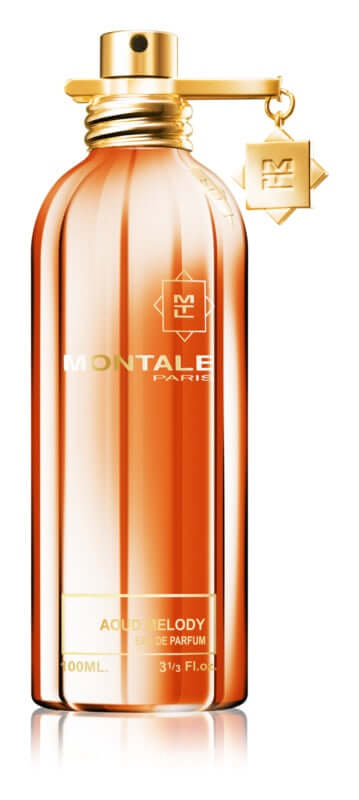- Home
- Montale Aoud Melody - Tester - HAUTE Parfums

Montale Aoud Melody - Tester - HAUTE Parfums
One of the main aromatic components in the Aoud Melody Eau de Parfum, the wood of the Aquilaria tree so loved by Pierre Montale, also known as eagle wood, agarwood, oud, aoud or (in Arabic) oudh, is a fascinating material with a resinous aroma and the most expensive wood in the world, and has been used for centuries to make incense and (especially Arabian) perfumes. This truly regal ingredient, also sometimes called “liquid gold” or “the wood of the gods”, appears in Montale Aoud Melody in combination with balsamic and spicy notes.
The aromatic composition of the Montale Aoud Melody Eau de Parfum opens in the head with notes of oud wood, leather, cloves, saffron and elemi resin. The floral heart contains Egyptian jasmine, delicate roses and sunny ylang-ylang. The warm creamy base consists of tones of sandalwood, amber and musk. The overall aroma offers the perfect harmony of the intense tones of oud wood with warm spicy and balsamic aspects and beautiful touches of leather and musk. The melody, which also appears in the name of the Eau de Parfum, is further emphasised by its wonderful floral heart.
- Montale Aoud Melody eau de parfum
- Top notes: Leather, Clove, Agar Wood, Elemi, Saffron
Middle notes: Jasmine, Rose, Ylang-Ylang
Base notes: Amber, Musk, Sandalwood - Original packaging is for reference only and is not included.
- 150 gram (weight)
- RRP £170.00 for 100ml
The lists of ingredients that make up the composition of parfums products are regularly updated. Commonly used ingredients are:
Alcohol ● Parfum (Fragrance) ● Aqua (Water) ● Alpha-isomethyl Ionone ● Benzyl Salicylate ● Limonene ● Linalool ● Ethylhexyl Methoxycinnamate ● Diethylamino Hydroxybenzoyl Hexyl Benzoate ● Citronellol ● Geraniol ● BHT ● Oil Extracts ● Citral ● Benzyl Alcohol ● Benzyl Benzoate ● Eugenol ● Coloring Agents ● Tocopherol ● DPG
The manufacturer is responsible for the ingredients of the product. We recommend checking the list of product ingredients directly on the manufacturer's website due to potential changes. Periodic updates to EU regulations could demand the for manufacturers to re-formulate existing fragrances to meet new regulations.
Be aware that large neck roller bottles may contain polymers to reduce leakage in according to regulatory packaging requirements. Roller bottles should not be transferred into spray bottles.
Allergies or Sensitivities:
If you suffer allergies or sensitivies, and before using a perfume product or the long-term use of fragrances, please check the latest updated list of ingredients from the original manufacturer to be certain that the ingredients are suitable for your personal use as they may differ, be updated or changed with new released batches.
Perfumes can also be used on clothes instead of skin to reduce direct skin contact. However, due to alcohol content or thickening agents, perfumes can have a small negative effect on fabrics:
The (EU) Cosmetics Regulation 1223/2009 lists the 26 most-known allergenic substances, which you can find in the link below:
- SSSofia S.Verified Buyer2 years agoRated 5 out of 5 stars5 Stars
One of the best perfumes I've ever owned. The scent is just right.
Was this helpful? - MWMagnus W.Verified Buyer2 years agoRated 5 out of 5 stars4 Stars
Was this helpful? - CDCian D.Verified Buyer4 years agoRated 4 out of 5 stars4 Stars
This fragrance has a unique blend that makes it perfect for any season.
Was this helpful? - @@hugo_momentsVerified Buyer4 years agoRated 5 out of 5 stars5 Stars
Was this helpful?

